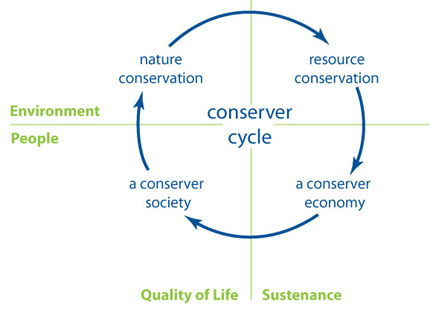Deep down, we all know we can’t go on like this. We can’t have a growing population and an ever-increasing gross national product forever. At some point, we need a new approach or face the consequences of scarcity and economic collapse. If we are going to change our economic and social path by choice, then we need to find solutions that actually improve our standard of living while decreasing the over-consumption of resources. Use less and live better.

To conserve is to use less.
It’s that simple. Use less natural resources and reduce our impact on nature. But what does it really mean to be a conserver?
Conservation is a deep-rooted Canadian value. It’s what your grandparents did, but it is also how we are shaping our future.
Conservation is how we express our connection with nature. It is the key to a sustainable future, a resilient economy, and a better, healthier lifestyle.
The conserver cycle starts with nature, including the preservation of wildlife and essential ecosystems. As we use natural resources to power our economy, conservation lowers our costs and ensures a sustainable supply for future generations. As a society, a conserver lifestyle reinforces sound policy and economic decisions. A conserver society also reduces waste and prevents pollution from entering natural ecosystems.
Above all, conservation is action. To be a conserver is to put your values into action.